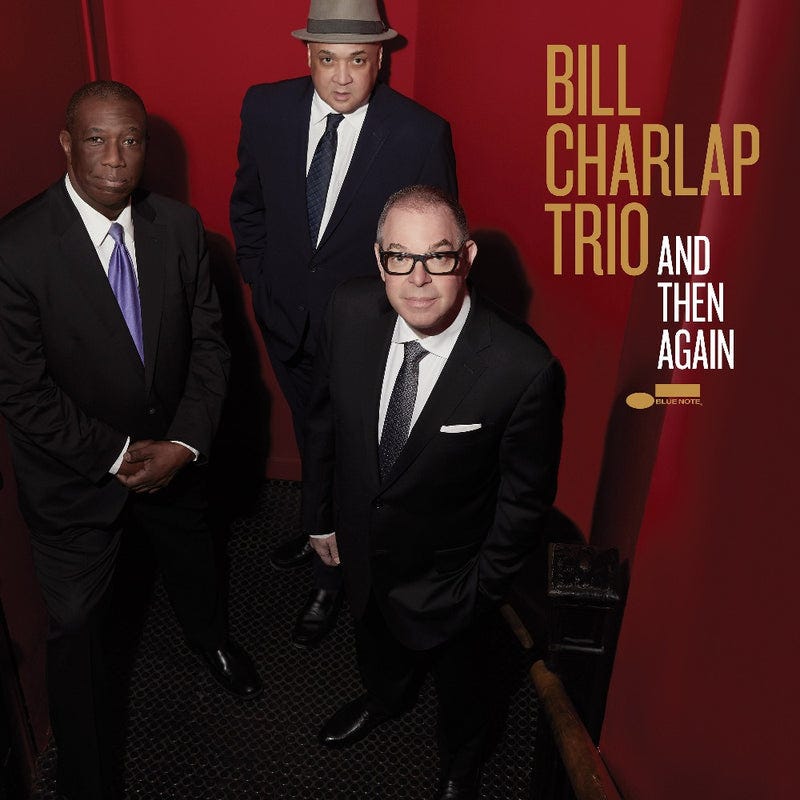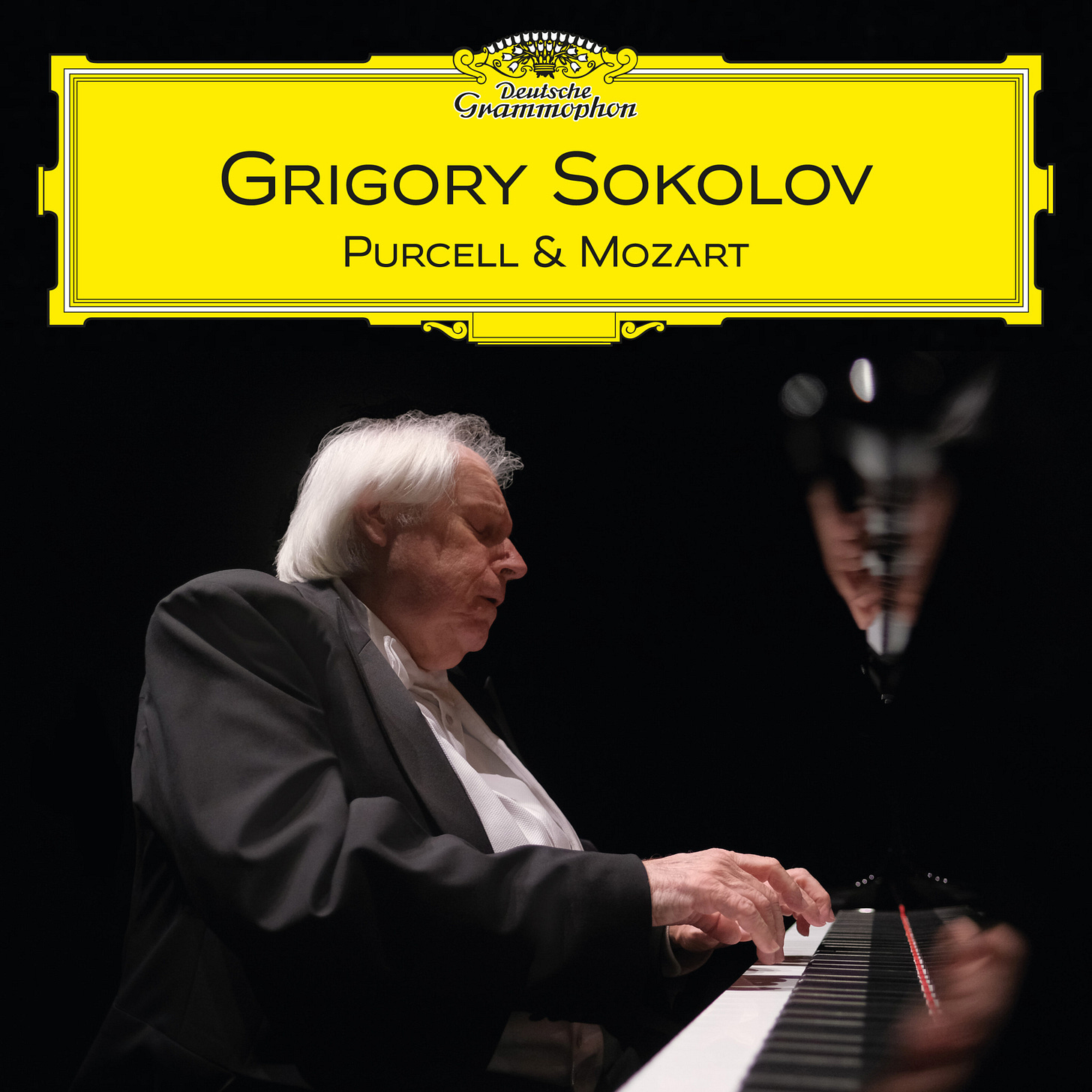TT 434: Bill Charlap and Grigory Sokolov
The standard bearers: new live records on Blue Note and Deutsche Grammophon
Pianists are often librarians. In their homes the sheet music stacks up on their instrument to the ceiling; the LP collection obscures every wall.
This has been true of classical pianists for a long time, but the jazz pianists are getting there as well. They know the repertoire. If you are wondering exactly how a piece goes, call a pianist.
There’s a certain tradition of New York City piano trio. The real deal. The serious business. Pretty tunes played with ultimate bebop know-how and a hard swinging rhythm section. Did it start with Bud Powell? In his wake followed a number of glamorous disciples: Tommy Flanagan. Barry Harris. Cedar Walton. Kenny Barron. There are more names in the running but not so many more. Thelonious Monk ain’t it, neither is Bill Evans, nor Kenny Kirkland or even Mulgrew Miller. A certain generous space, the songbook standards we all know, at first glance suitable for a saloon singer — yet under the hood a band that also exhibits undeniable personality and immense depth of swing.
Bill Charlap has been holding it down with Peter Washington and Kenny Washington for a long time. (“27 years and nearly 20 albums” says the press release.) Somehow, the trio keeps getting better. The latest is And Then Again, a live set taken from a week at the Village Vanguard.
There’s a certain subtle framing conceit at work with the title of the album, which is also the name of the first tune.
“And Then Again” is a bebop blues by Kenny Barron recorded on Barron’s 1985 album Scratch with Dave Holland and Daniel Humair. Scratch is a bit rowdy for a Barron record (and thus one of my favorites from the Barron discography) and concludes with “And Then Again,” which has one of Barron’s most avant-garde solos. I shouldn’t really guess what was in Barron’s mind, but the European rhythm section of Holland and Humair, while absolutely excellent, is not exactly Buster Williams and Ben Riley when considering swing. So why not take some chances? On “And Then Again,” Barron lets fly. The expressionist middle choruses are a pretty impossible blindfold test (not usually true of Kenny Barron).
So. The classic New York piano trio. Pretty tunes with teeth. (“Cannons buried in flowers,” Schumann said of Chopin.) Could work with Tony Bennett one day and Houston Person the next. Playing the Village Vanguard, for crissake. The curtain raiser is Barron’s wild tune, and Charlap himself plays wild. (I called Charlap and confirmed that he, too, loves Barron’s expressionist outing with the Europeans documented on Scratch.) The trio is raging.
After this epic statement, the setlist falls gracefully into place. Charlap is famous for unearthing obscure gems — this is another certain NYC piano player tradition, I’ve heard the stories of Tommy Flanagan and Jimmy Rowles trying to one up each other calling forgotten Tin Pan Alley tunes all night at Bradley’s — but on And Then Again, the melodies are actually incredibly familiar. Straight down the middle.
“And then again: All the Things You Are.”
“And then again: ‘Round Midnight.”
“And then again: The Man I Love.”
The tunes are old hat, but there are a thousand small details on every track that only could have come from the mind of Bill Charlap or Peter Washington or Kenny Washington. Together the three jauntily assert their command of a vanishing idiom.
The Washingtons push the beat. It shouldn’t swing so hard, but it certainly does. Charlap has all the time in the world to place interrogative improvised melodies against their driving feel. KWash is showing me something with this album. The drummer takes the first solo on “In Your Own Sweet Way,” just a chorus of cymbals, a mesmerizing moment.
I particularly like “Sometimes I’m Happy,” maybe because it has never been my favorite tune (despite the advocacy of Lester Young and Bud Powell). The trio takes it at a medium tempo, the ghosts of Ahmad Jamal and Erroll Garner hover, there’s something silly about the goofy phrases Charlap stumbles around in. Peter Washington is the ultimate for this speed. This is real jazz.
On the phone, Charlap told me that he stole the chordal set-up of “Sometimes I’m Happy” from Freddy Cole. He asked Cole if could “use” it and Cole said sure, go ahead, I played that tonight but I never did before and might not again.
The pianist as librarian: saving a Freddy Cole afterthought for posterity.
(The Charlap/Washington/Washington trio starts their second week of a two-week run at the Vanguard tonight.)
Grigory Sokolov continues the grand Russian tradition in the line of Sviatoslav Richter and Emil Gilels. His career never caught fire when it should have, but by now the Sokolov cult has grown; bootlegs on YouTube are studied by fans and young pianists, some who claim in the comments that Sokolov is the greatest alive.
For many years Sokolov did not make many official recordings, but just recently Deutsche Grammophon has been releasing tapes of vibrant live concerts. The latest is of Henry Purcell, Mozart, and varied encores recorded last year in Spain.
The pianist as librarian: Who plays an hour of Henry Purcell in a piano recital? Only someone who knows all the corners of the repertoire. Indeed, including a healthy serving of any Baroque composer other than Bach or Handel is an unexpected thing to do — except for Sokolov, who has been playing half a program of Couperin or Rameau for some time.
Sokolov’s trills in Couperin, Rameau, and Purcell are one of his signature effects. They speak almost like trills on a harpsichord: loud, fast and pure. This is technical wizardry of the highest order.
The reference is of course Glenn Gould, who pioneered playing obscure early music essentially “straight,” especially on a wonderful record of William Byrd and Orlando Gibbons.
The sound Gould makes at the piano is clear, cool, and groovy. Sokolov’s sound is made of deep bronze garnished with bright gold.
Not only do I not command the complete context to discuss Henry Purcell’s keyboard fancies, I’ve barely heard any of this music before — but this is certainly nothing for me to ashamed of. When you put “henry purcell” “piano” into the search box at Amazon there seem to be no solo recitals to be found in the CDs and Vinyl category. Is Sokolov actually the first to record a full album of Purcell on the piano?
Maybe DG missed a bet by not issuing the Purcell on its own. The Mozart B-flat sonata and B minor Adagio on disc two are also wonderful, of course, and more Sokolov is more Sokolov. But in Purcell — and indeed, in all of his fancy Baroque dance repertoire — the Russian virtuoso stands alone.
Bonus track: Bootleg of Grigory Sokolov playing Rameau: Suite in D, Bolzano, 30th August 2012.





Ahhh… no wonder I never heard of “him.” Lol!
You may have already found this, but in case not:
https://open.spotify.com/album/3ifDCWdPK9zTfp4ZSUtpPz?si=i3tHWKwgSWazsqVggdyzNg